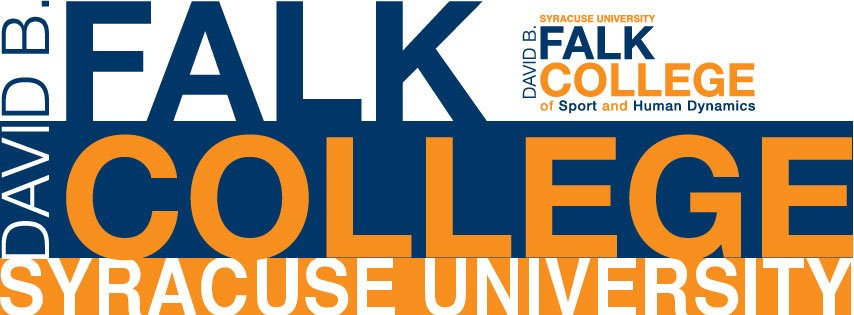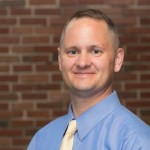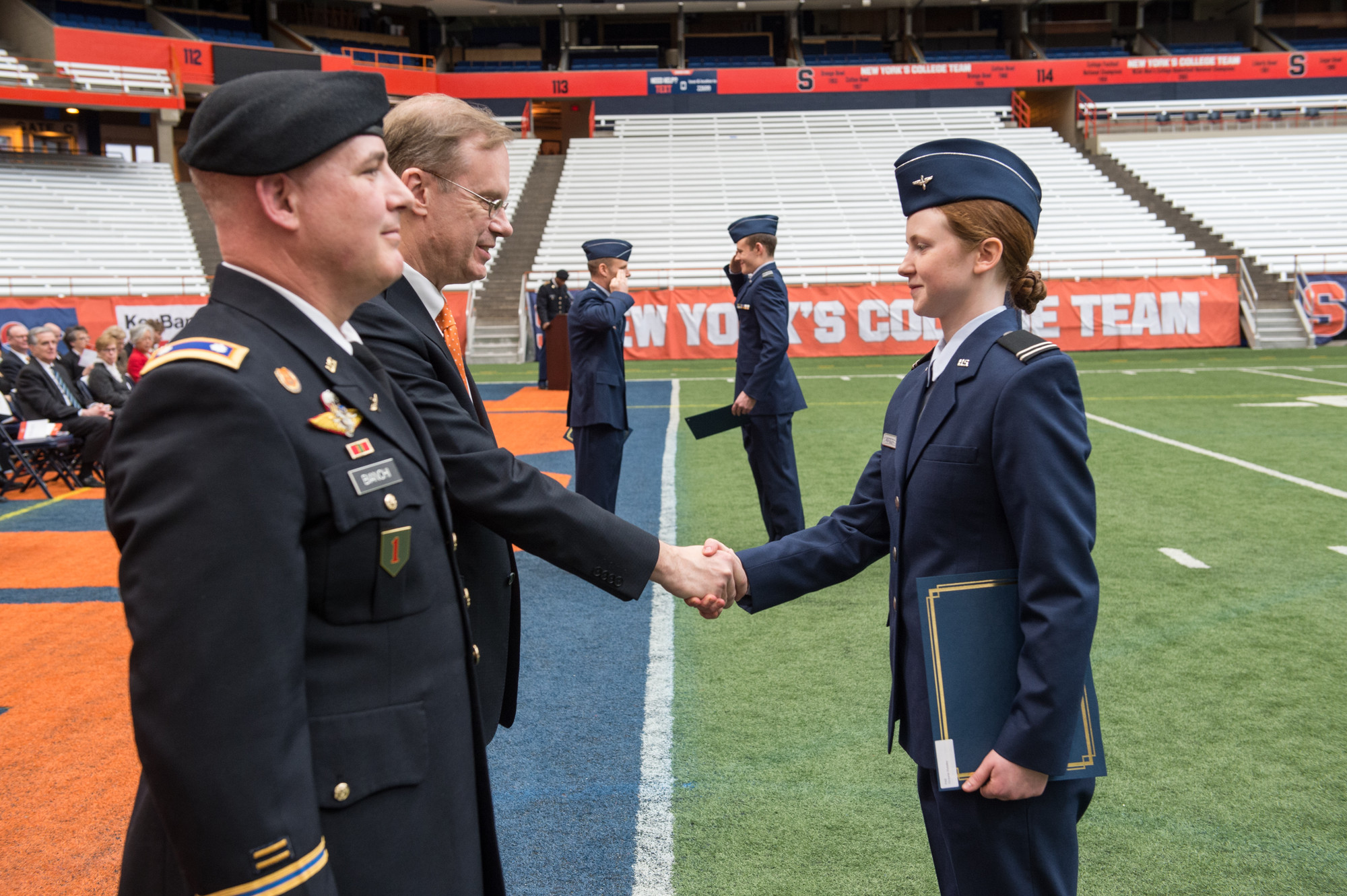 Chancellor Kent Syverud hosted the annual Chancellor’s Review & Awards Ceremony on Friday, April 3, 2015, at the Carrier Dome, to recognize the distinguished performance of cadets in the Army and Air Force Reserve Officers’ Training (ROTC) programs at Syracuse University.
Chancellor Kent Syverud hosted the annual Chancellor’s Review & Awards Ceremony on Friday, April 3, 2015, at the Carrier Dome, to recognize the distinguished performance of cadets in the Army and Air Force Reserve Officers’ Training (ROTC) programs at Syracuse University.
Following the introduction and formation of troops and the Chancellor’s review of the troops, awards were presented to deserving ROTC cadets. There are numerous civilian and military organizations that sponsor awards for cadets who have distinguished themselves through superior performance in academics, ROTC, and extracurricular activities. The Cadet Corps also sponsors ROTC program awards to recognize performance of a superior nature. View program for complete award information.
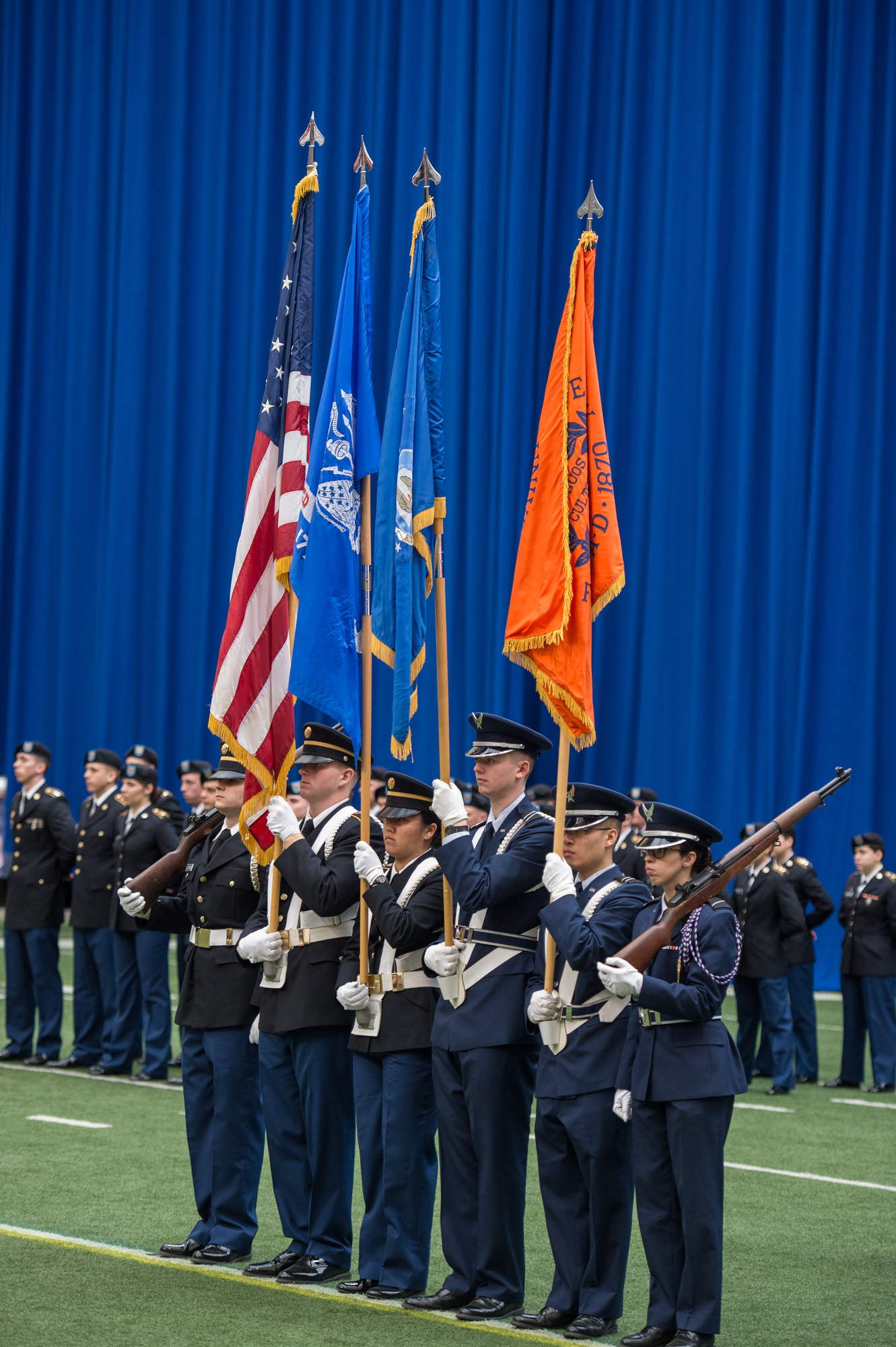 In his remarks, Chancellor Syverud congratulated the cadets for their achievements, distinction and grace, as well as reminded them that they are forever linked to Syracuse University, which established its ROTC program in March 1919. “You’ve inspired us by your commitment to being a student and a cadet,” shared Chancellor Syverud, who assured the cadets that the university will be here for them when they return as veterans. “We are determined to be the best university for veterans and as the Secretary of Defense shared with us on his recent visit to campus, ‘no place does it better than Syracuse University.’”
In his remarks, Chancellor Syverud congratulated the cadets for their achievements, distinction and grace, as well as reminded them that they are forever linked to Syracuse University, which established its ROTC program in March 1919. “You’ve inspired us by your commitment to being a student and a cadet,” shared Chancellor Syverud, who assured the cadets that the university will be here for them when they return as veterans. “We are determined to be the best university for veterans and as the Secretary of Defense shared with us on his recent visit to campus, ‘no place does it better than Syracuse University.’”
About the Office of Veteran and Military Affairs:
The Office of Veteran and Military Affairs (OVMA) serves as Syracuse University’s single point of entry for all veteran and military related programs and initiatives. Committed to being the “Best Place for Veterans,” OVMA assists university stakeholders to support and empower veteran, military connected, and military family member students and employees who are veterans at Syracuse University.
About the Army Reserve Officers’ Training Corps (ROTC)
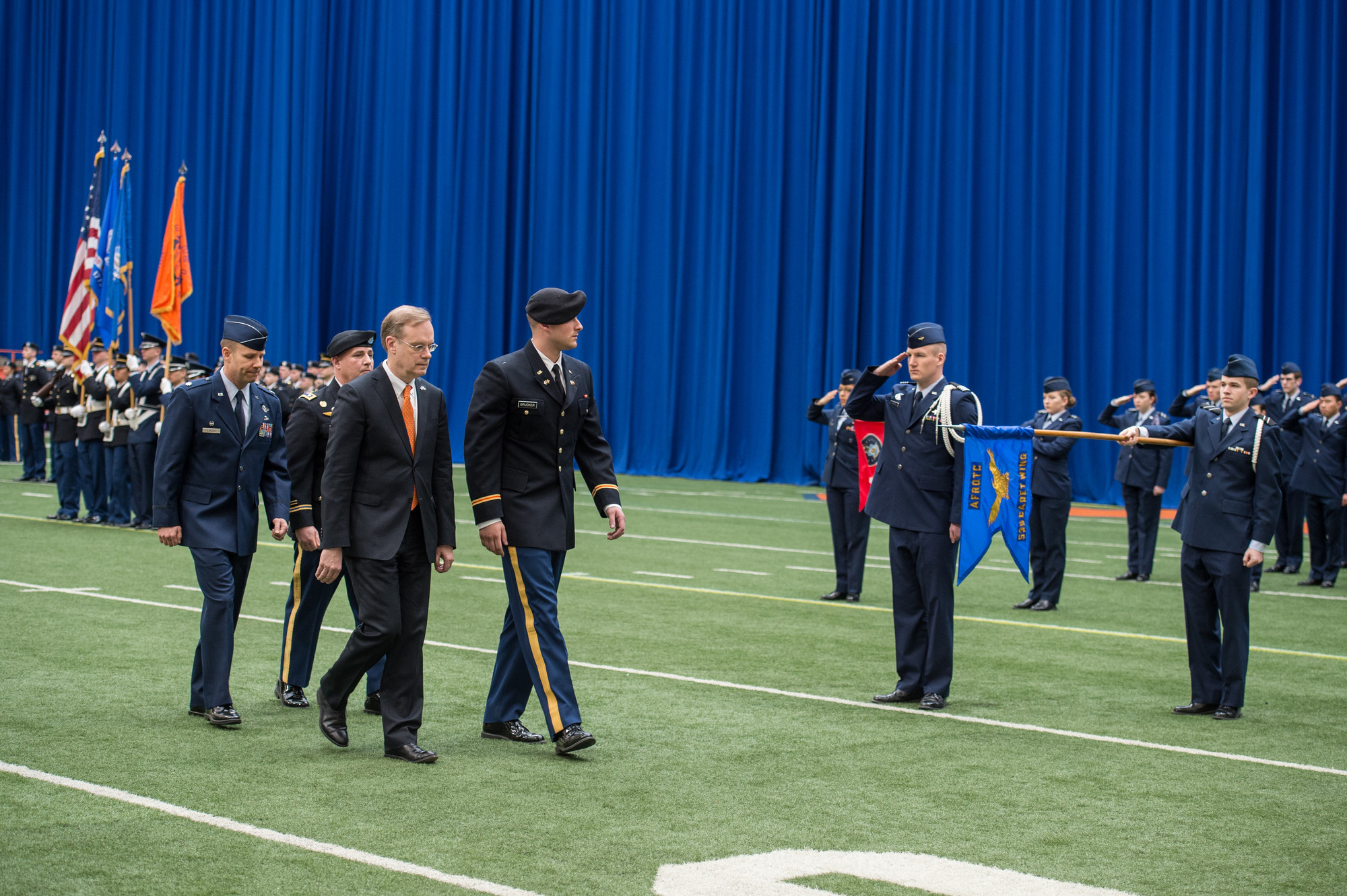 Army ROTC offers a commission as a second lieutenant in either the active Army or Reserve Forces in a variety of career fields including Combat Arms (Aviation, Armor, Artillery, Infantry, or Engineers), Combat Support, and Combat Service Support branches. There are two-, three-, and four-year scholarship programs available. Some cadets choose to join the National Guard or the Army Reserve while in Army ROTC, thus qualifying them for the Montgomery GI Bill benefits, in-state tuition (VANG) and other exciting benefits. Learn more …
Army ROTC offers a commission as a second lieutenant in either the active Army or Reserve Forces in a variety of career fields including Combat Arms (Aviation, Armor, Artillery, Infantry, or Engineers), Combat Support, and Combat Service Support branches. There are two-, three-, and four-year scholarship programs available. Some cadets choose to join the National Guard or the Army Reserve while in Army ROTC, thus qualifying them for the Montgomery GI Bill benefits, in-state tuition (VANG) and other exciting benefits. Learn more …
About the Air Force Reserve Officers’ Training Corps (ROTC)
Air Force ROTC is a program designed to train cadets to be commissioned officers in the United States Air Force. Here at SU, we pride ourselves on having a meticulously designed training environment which gives meaning to the Air Force’s core values, fosters good camaraderie among cadets, and produces only the finest Air Force officers. Learn more …

 Dave Gaulin (A&S 2002, MSSc, 2007) served on active duty for 13 years, flying the C-17 Globemaster III. He is now a Major and pilot in the Air National Guard and works in the telecommunications industry. Follow him @davegaulin
Dave Gaulin (A&S 2002, MSSc, 2007) served on active duty for 13 years, flying the C-17 Globemaster III. He is now a Major and pilot in the Air National Guard and works in the telecommunications industry. Follow him @davegaulin 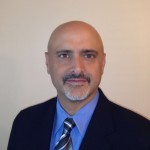 Steve Medeiros is a 2002 Graduate of the MSSc Program and served 28 years in the United States Marine Corps, retiring as a Colonel in 2013. Steve served in a variety of operational and staff assignments and his final assignment was the Commander, Marine Depot Maintenance Command (Albany, GA/Barstow, CA). He is currently the Lead Logistics Engineer for Wyle Laboratories in Stafford, VA.
Steve Medeiros is a 2002 Graduate of the MSSc Program and served 28 years in the United States Marine Corps, retiring as a Colonel in 2013. Steve served in a variety of operational and staff assignments and his final assignment was the Commander, Marine Depot Maintenance Command (Albany, GA/Barstow, CA). He is currently the Lead Logistics Engineer for Wyle Laboratories in Stafford, VA.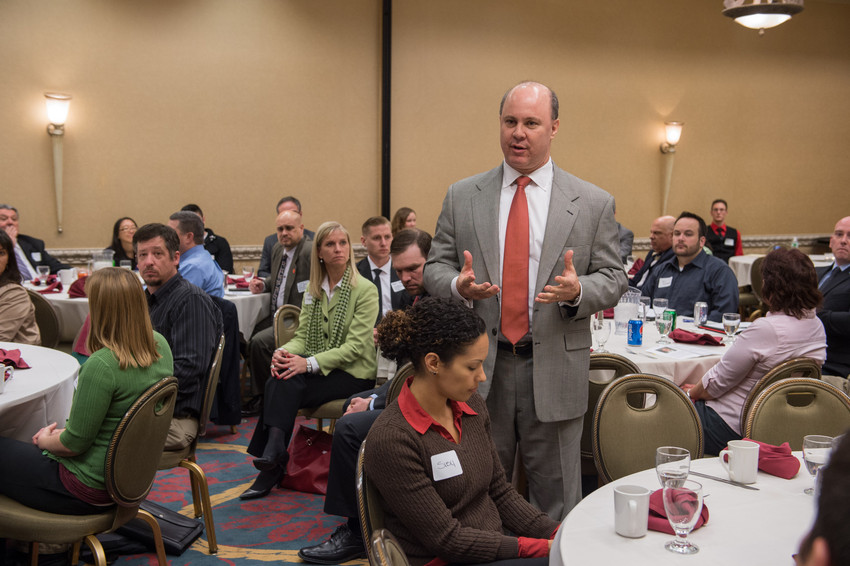
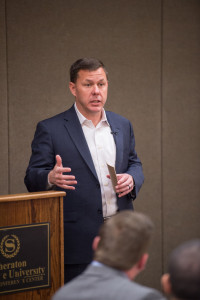 “Veterans bring a distinct character and a set of experiences and credentials that they need to know that they bring because it’s a difficult transition from the military to civilian life. So, if they are able to say that here’s the characteristics, values, experiences, and leadership that I bring to the organization then there’s value no matter what.” – Larry Iwanski, Executive Director, EY.
“Veterans bring a distinct character and a set of experiences and credentials that they need to know that they bring because it’s a difficult transition from the military to civilian life. So, if they are able to say that here’s the characteristics, values, experiences, and leadership that I bring to the organization then there’s value no matter what.” – Larry Iwanski, Executive Director, EY.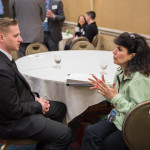 “The value veterans bring to a job in a non-military organization is based on skills and experiences that aren’t taught anywhere else. It’s absorbed during their time in the military. That should always be remembered.” – James Noonan, Program Manager, IBM.
“The value veterans bring to a job in a non-military organization is based on skills and experiences that aren’t taught anywhere else. It’s absorbed during their time in the military. That should always be remembered.” – James Noonan, Program Manager, IBM. Jack Milton is an alumnus of Syracuse University and also a military veteran. You should know his story, because it’s a Syracuse University story—one that speaks to our past, our present, and our future.
Jack Milton is an alumnus of Syracuse University and also a military veteran. You should know his story, because it’s a Syracuse University story—one that speaks to our past, our present, and our future. Under Milton’s leadership, his business experienced incredible growth and expansion. In 1982, he purchased the Maine Caterpillar Dealership, and later merged with the Massachusetts, Rhode Island, and Eastern New York Caterpillar territories in 1991. The company was renamed Milton CAT in 2004 with the procurement of the upstate New York Dealership, Syracuse Supply Company. By this time, Milton CAT stretched across the northeast, spanning from logging camps in Maine to underground salt mines and solid waste landfills in NY. Milton CAT also contributes to powering the region’s hospitals, backing up data centers, propelling workboats, and powering school buses and highway trucks. Today, Milton’s company covers six states, 15 locations, and is one of the top performing dealerships worldwide.
Under Milton’s leadership, his business experienced incredible growth and expansion. In 1982, he purchased the Maine Caterpillar Dealership, and later merged with the Massachusetts, Rhode Island, and Eastern New York Caterpillar territories in 1991. The company was renamed Milton CAT in 2004 with the procurement of the upstate New York Dealership, Syracuse Supply Company. By this time, Milton CAT stretched across the northeast, spanning from logging camps in Maine to underground salt mines and solid waste landfills in NY. Milton CAT also contributes to powering the region’s hospitals, backing up data centers, propelling workboats, and powering school buses and highway trucks. Today, Milton’s company covers six states, 15 locations, and is one of the top performing dealerships worldwide.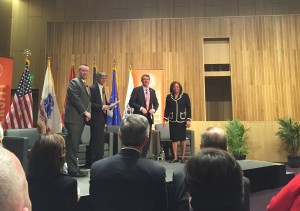 On his first domestic trip since taking office, Secretary Carter visited
On his first domestic trip since taking office, Secretary Carter visited 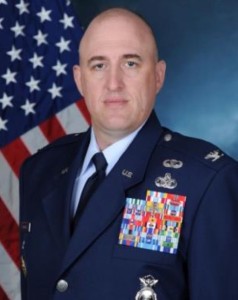 Colonel Erik K. Rundquist is Chief of Security Forces, Headquarters, Air Combat Command. In this position, he is responsible for security, law enforcement, antiterrorism, force protection and integrated defense across the Major Command. Colonel Rundquist was born at Whiteman Air Force Base, Missouri and received a regular commission upon graduation from the United States Air Force Academy in May 1991. He has served in various duty positions to include group commander, squadron commander, MAJCOM division chief, joint staff officer, operations officer, and ground combat instructor. He has deployed on several contingencies to include supporting the United Nations Protection Force in the Balkans, Operations ALLIED FORCE and SHINING HOPE in Albania and Kosovo, DETERMINED RESPONSE (USS Cole) in Yemen, ENDURING FREEDOM in Kyrgyzstan and Afghanistan, and IRAQI FREEDOM where he conducted an operational combat jump into Bashur, Iraq with the 173rd Airborne Brigade. He commanded security forces at Tallil, Iraq, was the J7 for the Combined Joint Special Operations Air Component Command at Balad, Iraq, and commanded the 455th Expeditionary Mission Support Group and Joint Task Force 1/455 at Bagram and Parwan Province, Afghanistan.
Colonel Erik K. Rundquist is Chief of Security Forces, Headquarters, Air Combat Command. In this position, he is responsible for security, law enforcement, antiterrorism, force protection and integrated defense across the Major Command. Colonel Rundquist was born at Whiteman Air Force Base, Missouri and received a regular commission upon graduation from the United States Air Force Academy in May 1991. He has served in various duty positions to include group commander, squadron commander, MAJCOM division chief, joint staff officer, operations officer, and ground combat instructor. He has deployed on several contingencies to include supporting the United Nations Protection Force in the Balkans, Operations ALLIED FORCE and SHINING HOPE in Albania and Kosovo, DETERMINED RESPONSE (USS Cole) in Yemen, ENDURING FREEDOM in Kyrgyzstan and Afghanistan, and IRAQI FREEDOM where he conducted an operational combat jump into Bashur, Iraq with the 173rd Airborne Brigade. He commanded security forces at Tallil, Iraq, was the J7 for the Combined Joint Special Operations Air Component Command at Balad, Iraq, and commanded the 455th Expeditionary Mission Support Group and Joint Task Force 1/455 at Bagram and Parwan Province, Afghanistan.
